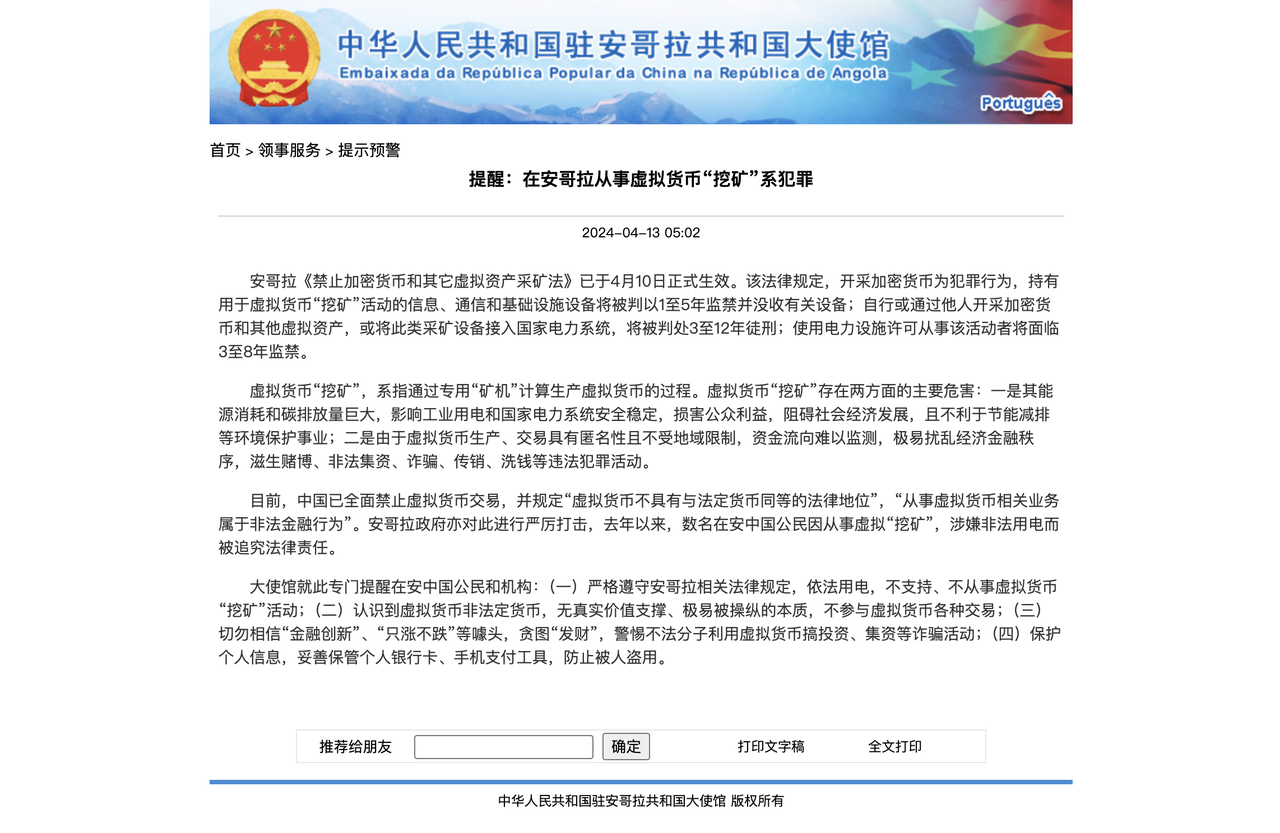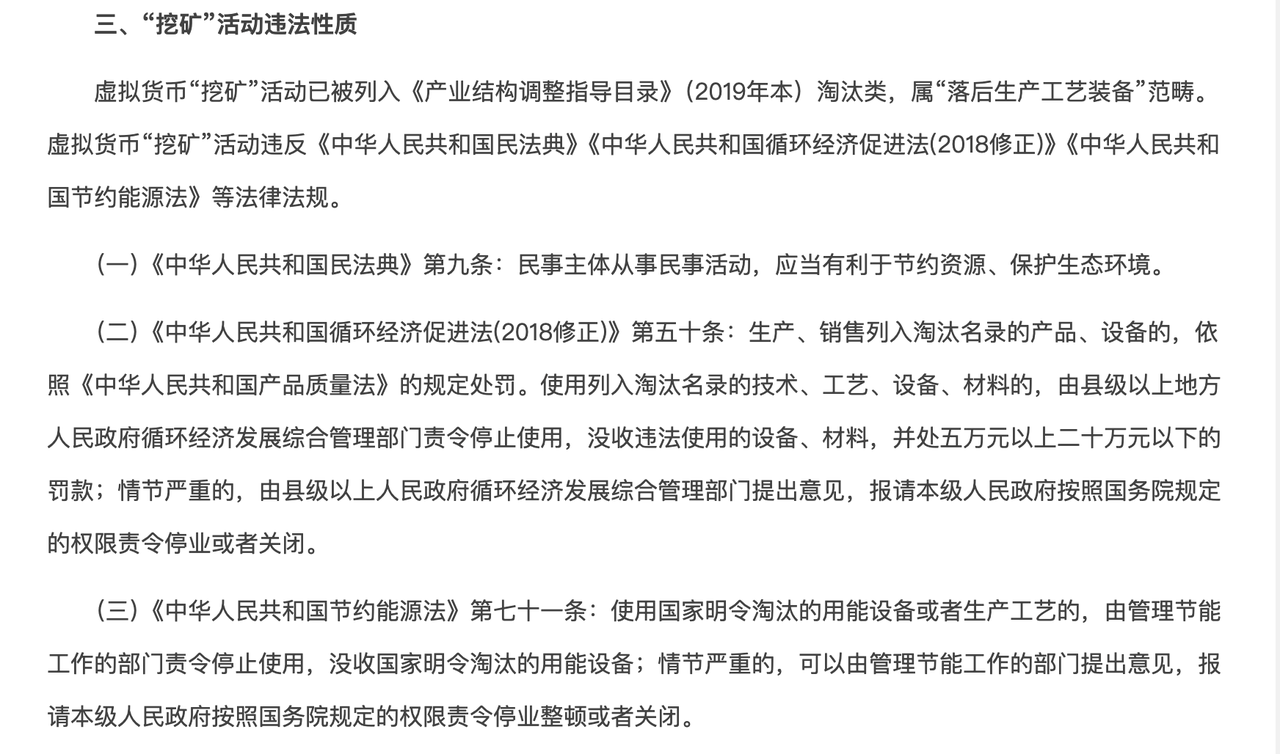Authors: Iris, Lawyer Xu Xiaohui
When it comes to Web3 mining, I wonder if anyone here has the same confusion as Attorney Mankiw: Can Chinese people still participate?
First of all, it is certain that Chinese people are currently unable to participate in the domestic mining industry.
As early as September 2021, my country issued the "Notice on the Regulation of Virtual Currency "Mining" Activities by the National Development and Reform Commission and Other Departments", which clearly prohibited the development of virtual currency "mining" under any name. Since then, a wave of miners going overseas has been set off in China, and a large number of mines have been transferred to countries and regions such as Australia and Europe.
So, can we sit back and relax when we go out to sea?
Obviously, that's not likely.
In 2022, regulators in countries and regions including Russia and the European Union also began to call for and ban energy-intensive crypto mining models, with BTC mining being the first to be affected. On March 5, 2025, the Chinese Embassy in Angola pushed a related article " Reminder: Comply with the law and do not engage in virtual currency "mining"" .

*Source: Announcement from the Chinese Embassy in Angola
The article points out that in April 2024, Angola introduced a policy to ban mining and began to carry out special operations to crack down on cryptocurrency mining activities in the country. In this activity, the Angolan side has cracked down on many cases of Chinese citizens participating in virtual currency mining. In addition, the announcement issued by the embassy previously pointed out that virtual currency mining is a criminal act. Whether participating in mining, providing electricity for mining, or even keeping related equipment, once investigated, they will face imprisonment ranging from 1 to 12 years.
Here, someone should mention another fact: Russia has begun to support BTC mining in 2024, and other countries such as Thailand have always been able to mine legally.
So, if we Chinese go overseas to these countries and regions that support virtual currency mining, can we legally mine?
And this is exactly the core issue that Attorney Mankiw wants to share with you in this article.
China's ban does not prohibit overseas mining
First, we carefully read the content of the "Notice of the National Development and Reform Commission and other departments on regulating virtual currency "mining" activities", which mainly involves the following points:
Comprehensively sort out and investigate virtual currency mining projects, including those that have been built, those under construction, and those with abnormal electricity usage monitoring;
It is strictly forbidden to invest in and build new projects, and a number of measures are taken to completely eliminate the possibility of adding new mining projects;
Accelerate the orderly exit of existing projects, and steadily rectify and clear out the virtual currency mining projects in operation.
It can be found that the ban itself only targets virtual currency mining activities within the country, and does not restrict overseas virtual currency mining. Therefore, based on the ban itself, there is no problem for Chinese citizens to set up mining farms overseas or participate in overseas mining farms to engage in virtual currency mining.

*Source: Guangdong Provincial Development and Reform Commission issued a "Popular Knowledge on the Illegal Nature of Virtual Currency "Mining" Behavior"
However, it should be noted that since virtual currency mining activities have been included in the elimination category of the "Guidelines for Industrial Structure Adjustment" (2019 edition), they fall into the category of "outdated production process equipment". Therefore, even if you do not engage in mining activities, but are involved in the production and sale of related equipment/products/technology, you still violate Article 50 of the "Circular Economy Promotion Law of the People's Republic of China (2018 Amendment)" and will be severely punished. This is also one of the key reasons why domestic mining machine manufacturers have also gone overseas.
In addition, the mined coins have to be sold. China's "Notice on Further Preventing and Dealing with the Risks of Virtual Currency Trading Speculation" issued in 2021 strictly prohibits overseas virtual currency exchanges from providing virtual currency trading services to Chinese citizens. Although there are still many ways to circumvent IP restrictions to trade virtual currencies, if you encounter any problems, such as black money, frozen cards, OTC fraud, etc., users can only bear the risks themselves, and Chinese law does not support rights protection.
If you feel that you can bear these risks and are determined to go overseas to mine, then the next question is the key: In those countries and regions where mining is legal, can Chinese citizens really enter the market with peace of mind?
Can Chinese people legally participate in overseas mining?
At present, there are some places overseas that are legal or clearly supported and are popular mining locations, such as Russia and Thailand. Here, attorney Mankiw will take these two countries as examples to sort out the regulatory frameworks for virtual currency mining they have promulgated, and whether they can allow Chinese people to participate legally.
Russia
In November 2024, Russia officially passed Act No. 237585-8, which clarified the legal framework for virtual currency mining. Among them, the prerequisite for legal participation in virtual currency mining is that units registered as legal entities or individual merchants in Russia must submit a "Virtual Currency Mining Activity Registration Form" to the Russian Ministry of Digital Development, Communications and Mass Media, and submit an application to the Federal Ministry of Energy. Only after approval can they access the designated power grid. In addition, individuals can also choose to participate in mining activities, but they can only conduct small-scale mining within the electricity consumption limit set by the government (no more than 6,000 degrees per month).
The bill does not specify whether the target is limited to Russian citizens, but can also include foreign citizens. Therefore, in theory, Chinese people can also go to Russia and legally participate in virtual currency mining. However, it should be noted that those who choose to mine overseas generally have a certain scale of mining machine clusters or mining farms. Therefore, it is recommended to register as a legal person or individual merchant in Russia first, and then participate in virtual currency mining activities in compliance with regulatory regulations.
Currently, Russian law allows foreigners to register as legal persons or individual businesses locally, but there are certain conditions. For example, when applying for an individual business as an individual, you need to live in Russia for a long time or hold a residence permit; if you choose to set up a wholly-owned limited liability company (LLC) in Russia, or form a joint venture with local residents/enterprises, you need to provide a registered address in Russia and appoint at least one Russian executive (such as a director or general manager).
Thailand
The Digital Assets Act 2022 issued by Thailand defines cryptocurrency mining as a "digital asset service" that can be applied for by companies or individuals. The Act requires that before starting virtual currency mining activities, a license must be applied for from the Securities and Exchange Commission of Thailand (SEC). At the same time, starting in 2025, companies engaged in virtual currency mining activities must use at least 50% renewable energy.
Similarly, the law does not specify the nationality restrictions of the target objects, so Chinese people can also legally participate in mining activities in Thailand. Therefore, in theory, the compliance items we need to consider include:
If registered as a company, the registered capital must reach 100 million baht (about 20 million RMB) and pass the anti-money laundering review. At the same time, the company application must rely on local partners, and the foreign shareholding limit is usually 49%.
If you participate as an individual, you need to ensure that the power of your equipment is ≤10 kilowatts and that you have reported the equipment information to the Ministry of Energy.
In addition, the proceeds from mining must be exchanged for legal currency through compliant exchanges, otherwise there may be money laundering risks.
Attorney Mankiw's Summary
Can Chinese people go overseas to mine legally? I believe that after reading this article, everyone has a general idea.
However, Mankiw needs to remind everyone that policies are not static. For example, although Russia opened up virtual currency mining in the second half of 2024, the bill passed on December 23, 2024 announced that 10 regions of Russia would completely ban mining from January 2025 to March 2031, and another three regions would partially restrict mining in each heating season before 2031.
Therefore, even if you go overseas to countries and regions where virtual currency mining is legal, you still need to clearly abide by local laws and regulations, remain sensitive to policy developments, and never take chances.
In addition, as Attorney Mankiw mentioned above, the transaction of virtual currency is not yet protected by Chinese law. At the same time, even if the funds are converted into cash overseas and repatriated to China, a series of regulatory issues including taxation and foreign exchange will be involved. Therefore, Chinese citizens should also take these factors into consideration when considering whether to participate in mining.
In short, the same old saying applies: the Web3 market is risky and investment should be made with caution.
/ END.







